The year ahead in Parliament
- Published
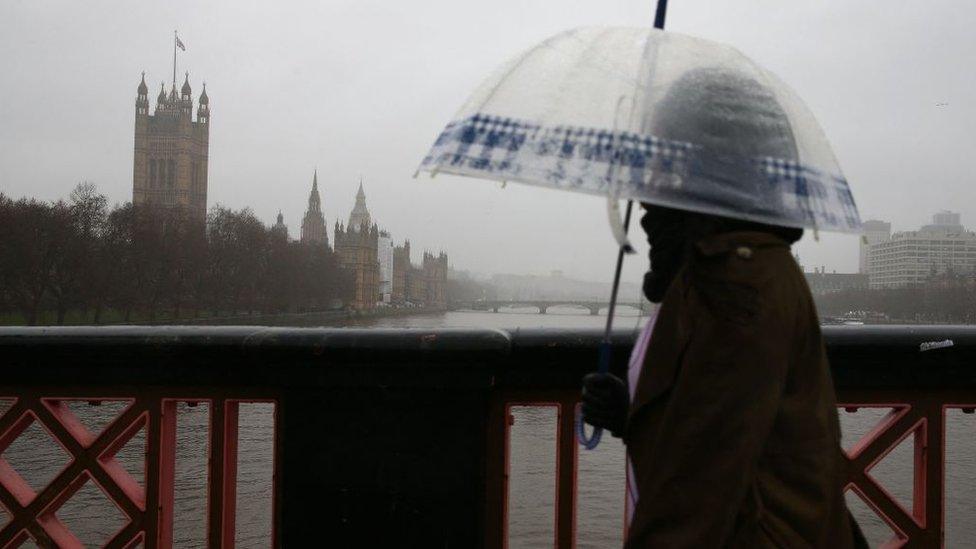
The year in Parliament ended with a bang - in fact a series of bangs and crashes - as the government ran into trouble over the Owen Paterson affair, then the Partygate scandal, and then over the new Covid restrictions aimed at curbing the spread of the Omicron variant.
So here are a few predictions and trends for the coming year, starting with one product of the recent events:
Snap election?
A 2022 election is off the table. There had been talk of the government repealing the Fixed Term Parliaments Act, and shortly after triggering an old-fashioned snap election.
But not so much now. With the cost of living ratcheting up, and the hangover from the pandemic (and maybe even the pandemic itself) unlikely to be dispelled be mid-year, most MPs now expect the government to go long, and hope that they will be in a position to present an alluring offer to the electorate in 2023/4.
Will I stay or will I go?
A career choice looms for the rather large number of senior ex-ministers now lurking on the Tory backbenches.
With the new parliamentary boundaries on which the next election will be fought due to be finalised by the Boundary Commissions, Labour has been pushing its sitting MPs to commit to another term, or go - and hence decisions to leave the Commons by high profile figures like Harriet Harman and Margaret Hodge.
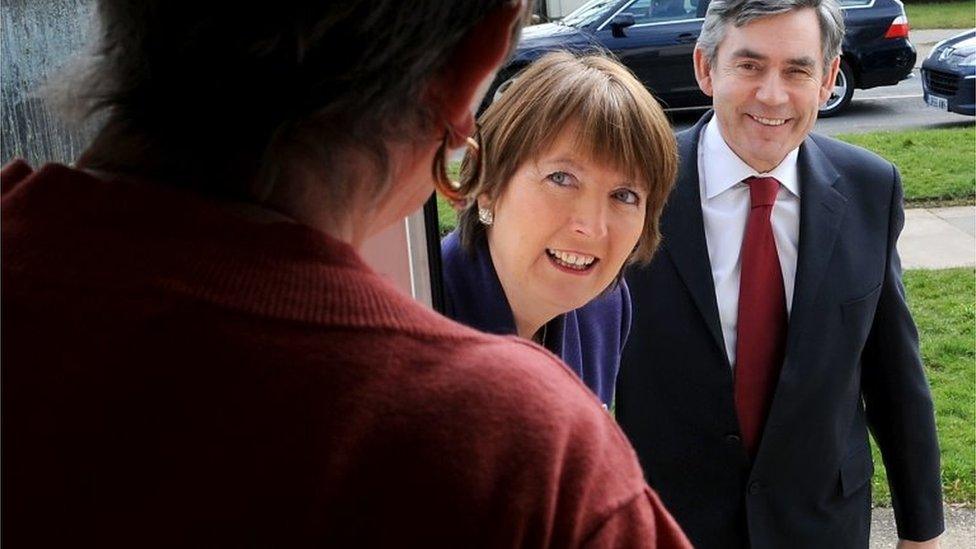
Harriet Harman served as Labour's deputy leader when Gordon Brown was prime minister
The same choice will soon confront Conservative MPs, and most especially the fair number of senior ex-ministers now on the backbenches.
Their answer to this question will reveal a lot about their judgement of the Conservatives' future,
Might they have the chance of a second coming as ministers if they cling on, and either a new prime minister invites them back through the pearly gates of Whitehall, or the current prime minister decides/is forced to call up some of the Old Guard?
Or, if they think that's unlikely, will they leave the green benches in search of some lucrative opportunity outside Parliament?
Mr Speaker is getting cross
The government keeps on making big announcements outside the Commons, Mr Speaker Lindsay Hoyle keeps on rebuking them, and they keep on doing it.
But with ministers under pressure, maybe it's bad politics to annoy the Chair.
Lindsay Hoyle says it is “not acceptable" for ministers to give briefings to the media before Parliament.
He has all kinds of ways in which he can make life difficult for the government - allowing more urgent questions, letting Prime Minister's Questions roll on a la former Speaker John Bercow, and maybe selecting inconvenient amendments for debate.
Both parties have something to lose here; the PM may find himself repeatedly tripped up in the Commons, or the Speaker could end up looking ineffectual, if his jeremiads are continually ignored.
Given that neither really wants a fight, maybe an armistice will be negotiated?
Select Committee power
It's striking just how much more assertive the denizens of the Committee Corridor are becoming.
The closing days of 2021 saw the Public Administration Committee urging the government to strike out a large chunk of its elections bill, a special committee making all kinds of recommendations to reshape the Online Safety Bill and Foreign Affairs pressing the government on China's human rights record in Xinjiang.
Business Energy and Industrial Strategy weighed in on Covid compensation and the Defence Committee called for action to protect women in the armed forces, including ensuring that rape trials are before civil courts, not courts-martial, and adding that the Royal Navy is now far too small to protect the UK.
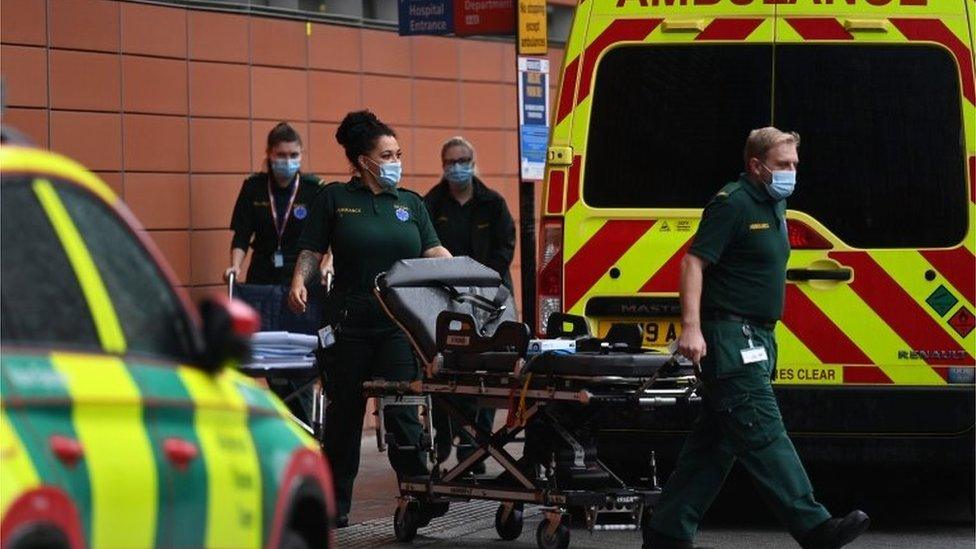
One committee chair is trying to change the law to improve training for NHS staff
On every front, the government is finding itself peppered with authoritative cross-party recommendations which are pressed in the Commons and if not accepted there, pressed again in the Lords.
(Watch out for the reincarnation of Health Committee Chair Jeremy Hunt's amendment to the Health and Social Care Bill, on training sufficient NHS staff).
Many committees will start a new cycle of inquiries in the new year (Defence looking at the RAF should be a humdinger) and a number of committee chairs see themselves as the real opposition, holding the government to account.
Lords a-leaping
The government has already been defeated 37 times in the current parliamentary year - the session that began on 11 May.
And with the Police, Crime, Sentencing and Courts Bill, currently at Report Stage, where most of the amending is done, with the Health and Social Care Bill next in line and the Nationality and Borders Bill coming up fast, plus changes to human rights law in the pipeline, you can bet on lots more rewriting of legislation in the teeth of ministerial opposition.
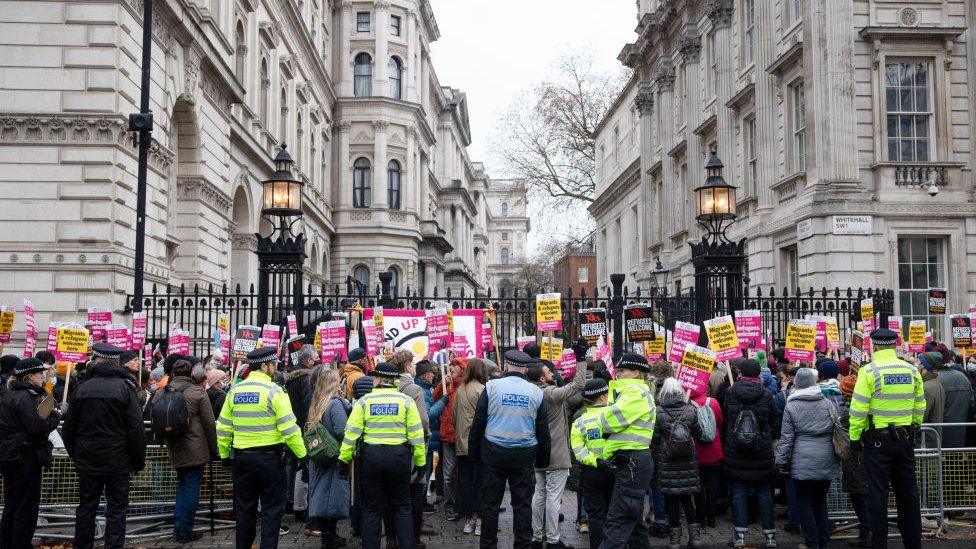
The government's borders bill has triggered protests outside Parliament and Downing Street
You can tell this is beginning to annoy the government, because the chatter about somehow clipping Their Lordships' wings is getting noisier.
Don't believe it. The reason the House of Lords has not had comprehensive reform is that it is just too time-consuming.
A government that set out on that course would have to spend at least a year getting Lords reform through, with little room for anything else - and no government can afford to devote so much time and effort to a cause voters care little for.
And that's leaving aside the point that legislation for Lords reform would have to be approved by, er, the Lords, unless ministers wanted to spend a further year invoking the Parliament Act.
Kicking the can down the road on R&R
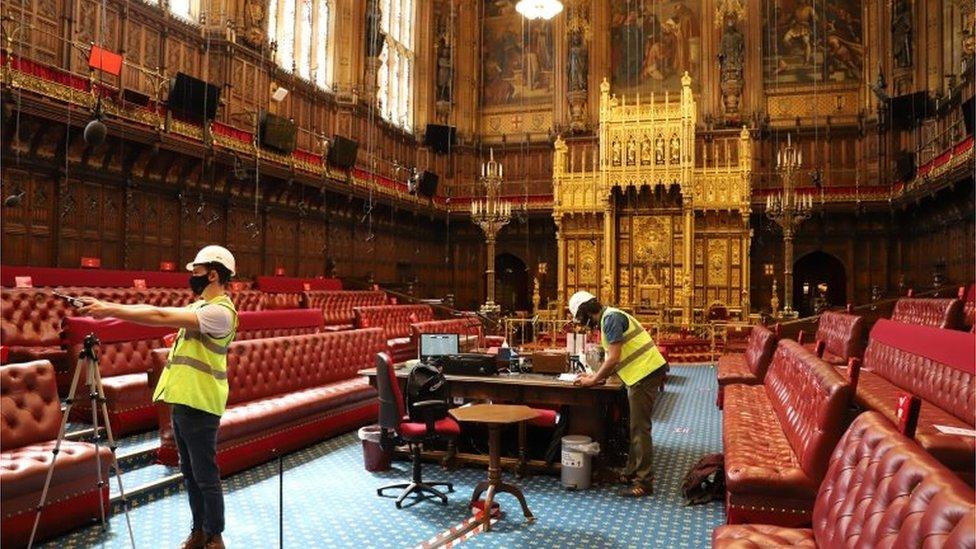
The can marked "Restoration and Renewal," the multi-billion pound scheme to revamp the crumbling Victorian buildings that form the home of Parliament, has been kicked so far down the road that it is now somewhere beyond the M25.
Moves are afoot internally to try and get the scheme out of the limbo of reviews and re-reviews to which it has been consigned, before a fire or a flood, or catastrophic failure of electricity or heating forces the parliamentarians out.
But it's far from a done deal that a solution will be agreed.
Street fighters?
Starmy's Army is suddenly scoring a few points; the Labour leader's shadow cabinet reshuffle may not have been an entirely serene exercise.
But it does seem to have teleported some effective street fighters into key political battlefronts, notably Wes Streeting into the shadow health brief, where his interventions thus far have displayed a sharp set of teeth.
It has made parliamentary politics look at least a bit more competitive.
Would-be leaders
Nothing succeeds like succession. Any hint of a prime minister in trouble flushes the would-be crown princes and princesses out of the Westminster undergrowth.
The tell-tale signs are sweeping "vision" speeches which range beyond their normal brief, an uptick in social media activity and campaigning on vote-catching issues (always remembering that the voters in question are first MPs and then the party faithful).
Plus of course some discrete wooing of MPs and some coalition-building with possible rivals.
It may all disappear with a flexing of prime ministerial biceps, next year, but if it keeps bubbling away, it can get out of control and become destabilising.
Making regulations
The pandemic has focused renewed scrutiny on a government's ability to impose lockdowns and quarantine rules with limited parliamentary scrutiny under what are called delegated powers.
In particular the prospect of ministers suddenly bringing in a new lockdown during the Christmas recess and asking MPs to rubber stamp the decision later, has caused some warning rumblings from Conservative backbenchers.
Many think the whole system is ripe for a rethink and a rebalancing, but governments will not fancy losing their ability to move fast in a crisis.
